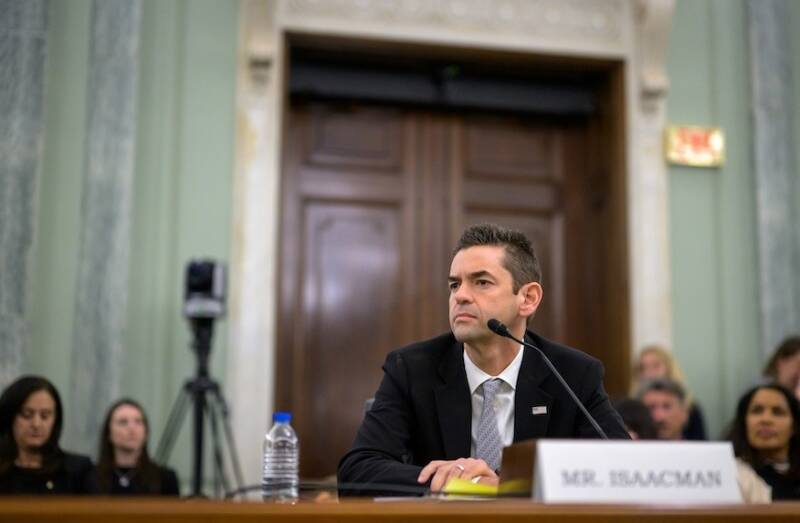In a sudden reversal on Saturday, former President Donald Trump withdrew the nomination of entrepreneur and commercial astronaut Jared Isaacman to lead NASA, just days before the Senate was set to vote on his confirmation.

Jared Isaacman, President Donald Trump’s nominee to be the next administrator of NASA, appears before the Senate Committee on Commerce, Science, and Transportation, Wednesday, April 9, 2025, at the Russell Senate Office Building in Washington. Image: NASA/Bill Ingalls
The White House confirmed Isaacman’s withdrawal hours after the news was first reported by Semafor, with speculation of the decision circulating online earlier via political ally and unofficial Trump advisor Laura Loomer. The move came shortly after NASA released its detailed proposed budget, which included sweeping cuts hinted at in Trump’s earlier “skinny budget.”
Isaacman, founder of Shift4 and commander of multiple commercial spaceflights aboard SpaceX’s Dragon capsule, had been nominated in December 2024 and advanced through the Senate Commerce Committee in April with a 19-9 vote. Throughout the past six months, he had engaged with lawmakers across political lines and visited states with strong NASA ties to build support for his nomination.
In a statement on X (formerly Twitter), Isaacman expressed gratitude for the experience. “The past six months have been enlightening and, honestly, a bit thrilling,” he wrote. “I have gained a much deeper appreciation for the complexities of government and the weight our political leaders carry.”
While the White House has yet to provide a full explanation for the sudden withdrawal, President Trump later hinted via social media that Isaacman’s “prior associations” were a factor. Reports from The New York Times and donation tracking group OpenSecrets indicate that Isaacman had made political contributions to both Republicans and Democrats, including to Senator Mark Kelly (D-AZ), a former NASA astronaut, and George Whitesides (D-CA), a former NASA Chief of Staff.
His last recorded donation to a Republican was in 2016, raising eyebrows among some within Trump’s inner circle. Loomer also highlighted Isaacman’s $2 million contribution to support the 2017 presidential inauguration as another point of scrutiny.
Another possible contributing factor, insiders say, may be Isaacman’s close ties to SpaceX and its founder Elon Musk, a major GOP donor. Isaacman commanded the Inspiration4 and Polaris Dawn missions—both commercial flights aboard SpaceX’s Dragon capsule—and is leading the Polaris Program, which aims to push the frontier of commercial space exploration. The program's second mission, rumored to involve the first crewed launch of SpaceX’s Starship rocket, remains largely under wraps.
Senator Ed Markey (D-MA) questioned Isaacman during his nomination hearing about whether Musk was present during the Trump administration’s interview process. Isaacman declined to answer, further fueling concerns about undue influence, particularly as SpaceX continues to secure major NASA contracts.
Despite the controversy, Isaacman earned bipartisan praise. Sen. Tim Sheehy (R-MT), who introduced him at the nomination hearing, voiced his disappointment on X: “Astronaut and successful businessman @RookIsaacman was a strong choice by President Trump to lead NASA. I strongly oppose efforts to derail his nomination.”
Until a new nominee is announced and confirmed, NASA will continue to be led by acting Administrator Janet Petro, former director of NASA’s Kennedy Space Center.
A spokesperson for the White House, Liz Huston, reiterated the administration's commitment to aligning NASA with the broader "America First" agenda. “It’s essential that the next leader of NASA is in complete alignment with President Trump’s bold mission of planting the American flag on the planet Mars,” she said, noting that Trump will personally announce a new nominee soon.
In his farewell message, Isaacman remained hopeful and forward-looking: “I have not flown my last mission—whatever form that may ultimately take—but I remain incredibly optimistic that humanity’s greatest spacefaring days lie ahead.”


Add comment
Comments